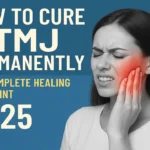Toothaches can strike at the worst possible times. The sharp, radiating pain that shoots through the jaw and head can be so unbearable that many people search online for a quick fix, including claims about how to “kill tooth pain nerve in 3 seconds permanently.”
But is such a thing really possible, or is it just a myth fueled by desperation and misinformation?
This article will take a deep dive into tooth nerve pain, explore why it feels so intense, debunk myths about killing a nerve instantly, and provide evidence-based solutions that actually work for permanent relief.
We will also look at the dangers of ignoring tooth pain, safe home remedies to ease discomfort, and the latest advancements in dental technology. Lets dive in!
Why Tooth Nerve Pain Feels So Intense
The human mouth is packed with nerve endings, and the pulp inside each tooth contains one of the most sensitive bundles of nerves in the body. When infection, trauma, or decay reaches the pulp, the pain can be overwhelming.
The reason tooth nerve pain radiates so strongly is due to the trigeminal nerve, the main nerve in the face that branches into the teeth, gums, and jaw.
Read More: The Rise of Gut-Health Issues in Urban India: A Complete Guide 2025
Once irritated, this nerve can send pain signals not only from the tooth itself but also to surrounding areas like the ear, temple, or even the neck.
Key Reasons Tooth Pain Is So Severe:
| Cause of Pain | Explanation | Why It Feels Intense |
|---|---|---|
| Pulp Exposure | Decay or fracture exposes inner tooth pulp | Direct nerve stimulation causes sharp pain |
| Inflammation | Infection leads to swelling inside the tooth | Pressure builds up, crushing nerve endings |
| Trigeminal Nerve | Shared pathways with head and face | Pain radiates to multiple regions |
| Sensitivity | Hot, cold, or sweet foods irritate nerves | Creates sudden, shooting pain |
“Tooth pain is not just discomfort—it is your body’s alarm system warning you of an underlying problem that requires attention.” – Dr. Amanda Lewis, DDS
Can a Tooth Nerve Really Be Killed in 3 Seconds?
The short answer is no—you cannot kill a tooth nerve in 3 seconds permanently at home. Despite the popularity of online claims, the nerve is protected by layers of enamel and dentin, making it impossible to access or destroy instantly without professional intervention.
Why Instant Solutions Don’t Exist
- Killing a nerve requires either a root canal procedure or tooth extraction performed by a dentist.
- Any attempt to chemically “burn out” or physically damage a nerve at home can result in severe complications like chemical burns, tissue necrosis, or life-threatening infection.
- Even in a dental office, numbing a nerve for treatment takes several minutes using local anesthesia—not seconds.
Thus, the idea of killing a tooth nerve in 3 seconds permanently is more of an internet myth than medical reality.
Myths and Dangerous Home Remedies
When people are in excruciating pain, they often turn to the internet for instant solutions. Unfortunately, many myths and harmful remedies circulate online, putting people at serious risk.
Common Dangerous Myths
| Myth / Remedy | Why People Try It | Risks Involved |
|---|---|---|
| Pouring Bleach | Belief it “kills bacteria” and nerve instantly | Severe chemical burns, tissue damage |
| Alcohol or Whiskey | Numbs the area temporarily | Can cause burns, not permanent |
| Burning with Metal | Desperation to destroy the nerve | Causes irreparable injury |
| Placing Aspirin Directly | Idea that it kills pain faster | Burns gum tissue, ineffective |
| DIY Extraction | Removing the tooth with tools | Risk of infection, uncontrolled bleeding |
“The worst cases I’ve seen in my dental practice were from patients who tried to self-treat their tooth pain with home remedies they read online.” – Dr. Michael Carter, Endodontist
It’s critical to understand that these so-called “remedies” don’t work and often make the situation worse.
Safe At-Home Relief Until You See a Dentist
While you cannot permanently kill a tooth nerve at home, there are several safe, temporary solutions to manage pain until you receive professional care.
Proven Temporary Relief Methods:
- Over-the-counter painkillers – Ibuprofen or acetaminophen can reduce inflammation and dull pain.
- Cold compress – Applying ice packs reduces swelling and numbs nerve activity.
- Saltwater rinse – Helps clean bacteria and soothe irritated gums.
- Clove oil – Contains eugenol, a natural anesthetic with antibacterial properties.
- Garlic paste – Mild antibacterial effects that provide temporary comfort.
- Elevating your head – Prevents blood flow from increasing throbbing pain.
These methods do not replace professional treatment but can provide valuable short-term relief.
Also Visit: Telemedicine’s Power: Making Healthcare Affordable for Everyone 2025
Permanent Dental Solutions That Work
To permanently address tooth nerve pain, professional dental intervention is required.
Permanent Treatment Options
| Treatment | Procedure | Effectiveness |
|---|---|---|
| Root Canal | Removes infected nerve tissue, cleans and seals tooth | High success rate, tooth preserved |
| Tooth Extraction | Entire tooth is removed | Permanent solution, but tooth lost |
| Crown Placement | Used after root canal to strengthen tooth | Long-term durability |
| Pulpotomy (for children) | Removes part of the pulp | Preserves developing teeth |
“Root canal treatment is not about killing a tooth—it’s about saving it by removing infection and restoring function.” – American Association of Endodontists
Unlike myths, these methods are scientifically backed, safe, and effective in providing permanent relief.
Risks of Ignoring Tooth Nerve Pain
Many people delay treatment due to fear of dentists or cost concerns. However, ignoring tooth pain can lead to life-threatening complications.
Dangers of Neglect:
- Infection spreading to jawbone
- Abscess formation (pus buildup)
- Bone damage and tooth loss
- Systemic illness (bacteria can spread to heart, brain, or bloodstream)
In the USA, untreated dental infections send thousands of people to emergency rooms every year—proving the importance of addressing tooth nerve pain quickly.
Advances and Future Innovations in Tooth Pain Treatment
Modern dentistry continues to evolve, offering less invasive and more effective treatments.
Innovations on the Horizon:
- Laser dentistry for painless root canals and cavity removal.
- Regenerative endodontics using stem cells to regrow pulp tissue.
- 3D imaging for precise diagnosis and treatment planning.
- Biocompatible materials that extend the life of dental restorations.
These advancements promise a future where tooth nerve pain may be managed more efficiently and with less discomfort.
The Human Side of Living with Tooth Pain
Tooth pain isn’t just physical—it affects daily life, relationships, and mental health. People with chronic dental issues may experience:
- Difficulty eating or sleeping.
- Embarrassment in social settings due to visible damage or swelling.
- Anxiety and depression linked to ongoing discomfort.
Addressing tooth nerve pain is not only about physical health but also about restoring confidence and quality of life.
FAQs on Tooth Nerve Pain and Permanent Relief
What is the fastest way to stop tooth nerve pain?
Temporary relief methods like ibuprofen, clove oil, or a cold compress may help, but only a dentist can provide permanent relief.
Can I kill a tooth nerve at home in 3 seconds?
No, this is a myth. Only professional treatments like root canals or extractions can eliminate nerve pain permanently.
How long does a root canal take?
Typically 1–2 hours, but results are permanent and preserve the tooth.
What happens if I don’t treat tooth nerve pain?
The infection can spread, causing abscesses, bone loss, or even systemic illness.
Is tooth extraction better than a root canal?
Extraction removes the problem permanently, but root canals preserve natural teeth. The best option depends on your condition.
Conclusion:
The idea of being able to kill tooth pain nerve in 3 seconds permanently is more fiction than fact. While myths and dangerous remedies promise instant results, they only increase the risks of severe damage and infection.
True permanent relief comes from professional dental care such as root canals or extractions, which not only resolve the pain but also protect your long-term health. In the meantime, safe at-home remedies can provide temporary comfort until you see a dentist.
Tooth pain is your body’s signal that something is wrong—don’t ignore it. Seek professional help, avoid harmful myths, and invest in modern treatments that offer real, lasting solutions.











